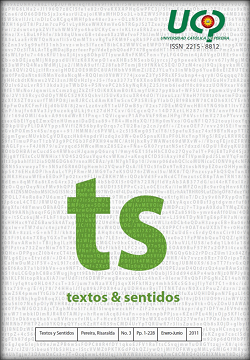Educación estética para un mundo en crisis: Repensar a Schiller para el siglo XXI1
Palabras clave:
Schiller, pensamiento, contexto histórico y social, educación de los sentimientos, libertad, sociedad, cultura de masas, modernidad, pensamiento críticoResumen
El propósito de este ensayo es recuperar el pensamiento del poeta y fi lósofo Friedrich Schiller sobre la educación de los sentimientos, en el contexto histórico social de
crisis global que caracteriza los inicios del siglo XXI. Schiller hizo un severo análisis sobre la crisis histórica que vivía la sociedad de su tiempo y sobre las causas por las cuales la razón ilustrada y el deber-ser ético estaban fracasando en el intento de convertirse en fuerza moral y política para establecer repúblicas de ciudadanos libres. Concluye que la causa está en la desvinculación de razón, moralidad y sensibilidad; que es necesario superar el deber-ser de Kant, y que el arte y la belleza son el medio de educar los sentimientos para elevarse a un estado de verdadera libertad, en lugar de retroceder a una edad oscura de irracionalidad y barbarie. De esta manera, una relectura de Schiller ilustra una
tarea fundamental para enfrentar la crisis contemporánea en la sociedad de cultura de masas, y a la vez anticipa la respuesta a los fracasos de la modernidad en la tradición del pensamiento crítico, tal como lo presenta J. Habermas.
Referencias
Cortina, A., Conill,J. (Edit.) (2001): Educar en la Ciudadanía. InstituciónAlfons El Magnànim, Valencia.
Cortina, A. (2006): “La Revalorización de lo Humano en un Mundo Individualista e Interdependiente”, en (Varios) Desafíos y Oportunidades en el Siglo XXI, Cemex, Madrid.
García N, J.: “Más allá de la posmodernidad: el diálogo ciencia-razón-fe desde la perspectiva de Zubiri”. Comunicación en el IV Simposio Internacional del IPI. Universidad de Salamanca, Octubre 2008. (En prensa)
Habermas y Otros (1991): Habermas y la Modernidad, Ed. Cátedra. Madrid.
Habermas, J (1989): El Discurso Filosófi co de la Modernidad. Taurus. Madrid.
Habermas, J (1988): “La modernidad, un proyecto inacabado”, en Ensayos políticos. Península, Barcelona. (“La Modernidad: proyecto incompleto”. Punto de Vista Nº19. Buenos Aires. Agosto 1998).
Habermas, J (1988a): Facticidad y Validez. Trotta, Madrid.
Rorty, R. (1991): “Cap.3 Habermas y Lyotard sobre la posmodernidad”, en Habermas, J. y Otros: Habermas y la Modernidad, Ediciones Cátedra. Madrid.
Schiller, F. (1795/1990): Kallias. Cartas sobre la Educación Estética del Hombre. Ed. Anthopos. Barcelona.
Schiller, F. (1789/1991):Escritos de Filosofía de la Historia. Universidad de Murcia.
Zubiri, X. (1984): Inteligencia Sentiente. Inteligencia y Realidad. Madrid, Alianza Editorial.
